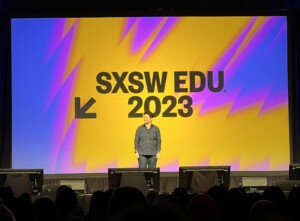Next-Gen Research On Next-Gen Tools

A national research agency received a grant “to frame a program of research reviews [focused on learning technology] that would summarize, synthesize, and draw conclusions from the research. An ongoing program of research reviews would help educators, developers, and policymakers to monitor and apply the latest research in the development and implementation of learning technologies and also to identify key questions and methodologies for future research and development.” That’s an ambitious assignment given the scope and speed of the ” spontaneous explosion of entrepreneurial activity in education. ” They called last week and we discussed how to structure a next gen research program. First, I drew the distinction between backward-looking and forward-leaning research. Traditional methodologies, including Randomized Controlled Trials, are useful for accurately identifying attributable effects of interventions in stable environments. Unfortunately, that doesn’t apply to much in this category. We’re in one big design phase — designing learning tools, experiences, and environments. That suggests short cycle directional research focused on improvement and innovation and conducted in conjunction with product development. I’ve suggested that helping teachers find and create their own short-cycle experiments could lead to improved efficacy. These days, most tech tools are developed in a lean startup environment, starting with a hunch, validating with data, and running iterative product releases on short product development cycles that incorporate customer feedback. With hundreds of organizations conducting simultaneous development, a connection to primary research, a network of schools willing to try stuff (e.g., League of Innovative Schools) and some data gathering infrastructure would be valuable. And speaking of primary research, at this point in the conversation I mention Kaplan CAO Bror Saxberg, the sector’s most persistent advocate for more primary research into the neurobiology of learning. Moving on, I discussed important categories of research:
- Adaptive learning tools (assessment and instruction): Reading, writing, and math in elementary, middle, and high. This could include a “bake-off” between existing products, an extension of STEMworks Database, from Change the Equation, which provides information on promising preK-12 products. Study the unique pathways to competence traveled by different students. (I’m planning classroom trials of writing assessments.)
- Blended school models : Utilizing Innosight Institute’s ” Classifying K-12 blended learning,” a program of research could evaluate the effectiveness of new models.
- Customization: Creating and evaluating models of multi-modal learning progressions using a variety of assessment and observation instruments, and extension of School of One. The hypothesis to test: will matching level and best learning modality boost learning?
- Motivation: I keep saying that motivation sciences will yield the big breakthroughs in this decade, but that will require a handful of big data research projects that analyzes how different students respond to different learning experiences.
- Competency-based learning: Lots of us assume that getting rid of seat time and allowing students to progress at their own rate will work better but there’s not much research on that topic and it changes everything — learning environments, tools, schedules, funding, and staffing — and deserves more study.
- Online learning: as noted last week in Better Learning Online, researchers should consider R&D partnerships with online learning providers-they already live in the data rich learning environment of the future.
- Special needs: The work of RethinkAutism and PresenceLearning suggest the potential for a new generation of tools aimed at special needs. A focused special needs R&D agenda could dramatically improve learning for millions of students in the near future.
Their final question was “What audiences might be interested in edtech research?” My answer, “Everyone!” Well, at least a lot more than would have been the case a decade ago. Now that parents, students, and teachers are leading the subversive app adoption revolution, there are millions of us trying to figure out what works. Product reviews and Yelp-like user feedback is a start. Bake-offs and prizes like ASAP help focus and accelerate innovation. Crowdsourcing will enlist thousands of classrooms in efficacy trials. Adding a research infrastructure to the hypothesis testing and rapid development cycles now common among lean startups would accelerate innovation and build sector knowledge. It’s time for next-gen research on next gen tools. This blog first appeared on EdWeek.








0 Comments
Leave a Comment
Your email address will not be published. All fields are required.